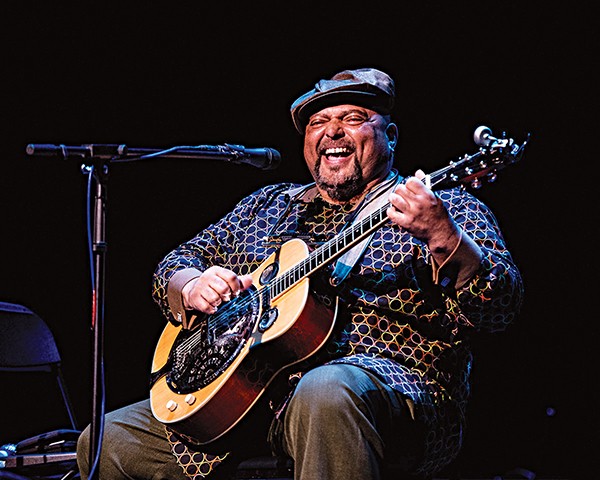It’s hard to imagine a massive annual music festival, one that brings thousands to Memphis every year, somehow taking place under the very noses of the unsuspecting locals. Yet that’s exactly what happens every January, when the International Blues Challenge (IBC) goes down. The 2019 version starts Tuesday this week in various clubs along Beale Street, Main Street, and Second Street, culminating with the finals at the Orpheum Theatre on Saturday, January 26th.
As Blues Foundation president Barbara Newman notes, “We did an economic impact study and learned that this event brings close to $4 million of fresh tourism money into Memphis every year. And that doesn’t even account for the peripheral stuff that happens when people stay after the event to visit Mississippi or spend extra time in Memphis. Everything takes a big bump up during IBC week. And it’s an otherwise quiet, almost dead time for Memphis. So it’s great that we’re here to energize the city every year.”
 Roger Stephenson
Roger Stephenson
Kevin Burt
And, Newman adds, the IBC affects every community that sends artists to compete. “One part of it is discovering that next great musician that’s ready to take a bigger stage. But another part is about offering the blues societies an opportunity to do something engaging in their local communities to keep the blues scene vibrant where they are.”
This year, blues societies worldwide, having staged their own mini-competitions, are sending local winners from as far away as South Korea. And for those who come, the experience can be life-changing.
“Susan Tedeschi was an IBC finalist,” says Newman. “Southern Avenue didn’t even make it into the top three, but they got a label deal. Then they won best emerging artist at the BMAs last year. Danielle Nichole and her brother won in 2008, and she’s up for a Grammy this year. [2018 winner] Kevin Burt went on to record his first CD, and he just got nominated for a Blues Music Award as best emerging artist.”
I tracked Burt down somewhere in his home state of Iowa to ask about the experience of winning best solo performer at the IBCs. “It’s created a lot of opportunities for me that I don’t think I would have been able to create on my own,” he said. “But, win, lose, or draw, I made some contacts, and I knew I was going to go some places that were outside of my reach, just having had the chance to network with people. There’s so much information and there’s so much opportunity, just walking around. The workshops they have, the different panel discussions that they do. It’s almost like getting a new set of keys. It’s a whole lot easier to get through certain doors if somebody gives you a key.”
Burt’s success is also an object lesson in how stylistically diverse contenders can be. One of the standout songs in his prize-winning set was a version of “Eleanor Rigby,” by the Beatles. “As I see it, I get to define my blues,” he says. “If I sing ‘Happy Birthday,’ I’m telling you I really want you to have a happy birthday. That emotional connection is to me what the blues is. There’s too many folks that get caught up in a specific sound.”
Paul Benjamin, who’s been an IBC judge many times over and now orients each year’s incoming judges, agrees. “Originality is important,” he says. “Judges don’t wanna hear ‘Mustang Sally’ or ‘I Got My Mojo Working.’ I go over the criteria with them. It’s broken down into the categories of originality, talent, vocals, and stage presence. Each is weighted, and originality’s weighted by three, whereas talent, vocals, and stage presence are weighted by two.”
For Burt, originality is tied to spontaneity. “I didn’t put together a set list for the IBC. Every experience I had while I was down there helped to shape my set list for the next show. That’s how I’ve always done this. I walk into the room, and I don’t know what I’m gonna do until I’m doing it. There’s something about that nervous energy that helps me connect. There’s a feeling that you get.”